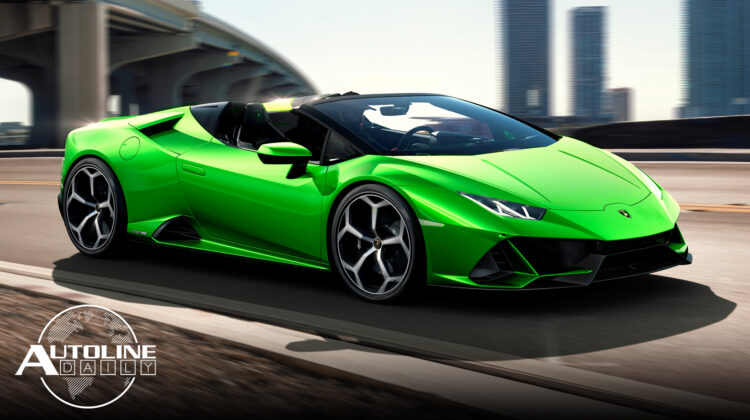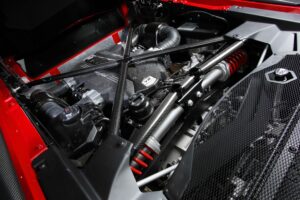
Listen to “AD #3260 – Lambo Wants to Keep ICEs; OEMs Put the Squeeze on Suppliers; USPS Decision to Stick with ICE Fleet Flawed” on Spreaker.
Follow us on social media:
Runtime: 8:48
0:08 Ambassador Bridge Blockade Causes $850 Million In Damages
0:51 BMW Gets Big Economic Benefit from Increasing China JV Stake
1:48 USPS Decision to Stick with ICE Fleet Flawed
3:10 Jeep Teams with Razor to Launch Electric Scooter
3:50 Toyota Boosts Commitment to Hybrids
4:32 Lamborghini Wants to Keep IC Engines Beyond 2030
6:30 Automakers Put the Squeeze on Suppliers
7:06 George Soros Buys Millions of Rivian Shares
7:35 Tesla Denies Plans to Open Second China Factory in Shenyang
Visit our sponsors to thank them for their support of Autoline Daily: Bridgestone, Intrepid Control Systems and Schaeffler.
This is Autoline Daily, the show dedicated to enthusiasts of the global automotive industry.
AMBASSADOR BRIDGE BLOCKADE CAUSES $850 MILLION IN DAMAGES
Good news for the auto industry. The Ambassador Bridge has reopened. COVID mandate protestors in Canada blockaded the bridge last week. That bridge connects the U.S. and Canada through Detroit and it’s a major artery for new cars and components. GM, Ford, Stellantis and Toyota all had production disruptions. And that forced hundreds of suppliers to shut down. But even though the bridge is open again, analysts say it could take weeks for things to get back to normal because the protest upended the supply chain. According to IHS Markit, the 6-day blockade caused up to $850 million in economic damage to the auto industry.
BMW GETS BIG ECONOMIC BENEFIT FROM INCREASING CHINA JV STAKE
As we’ve been reporting for some time, foreign automakers in China are now allowed to take a controlling interest in the joint ventures they have with Chinese car companies. Years ago, China forced all foreign car companies to form joint ventures. When Tesla set up shop in China, it was given an exemption. Last week we told you that BMW boosted its JV ownership up to 75% when it previously had 50%. Now we’ve learned that’s going to give BMW a one-time effect that will boost its earnings by up to €8 billion and generate €5 billion a year in free cash flow. When BMW only owned 50% of the JV, it had to give half of its profits to its partner Brilliance Automotive. Now it gets to put more of that money in its own pocket. And that’s got other foreign automakers looking at how they can boost the ownership of their JVs.
USPS DECISION TO STICK WITH ICE FLEET FLAWED
The U.S. Post Office is still going to buy a new generation of delivery trucks with internal combustion engines. But Bloomberg broke a story documenting some of the parameters the Post Office used to justify its decision. And some of them are clearly out of date, or just plain wrong. For example, the Post Office assumed that gasoline would cost $2.19 a gallon over the life of the contract. Right now, the average price is $3.48, according to the AAA. That’s nearly 60% higher than the Post Office expected. It also assumed that charging stations would cost $20,000 per facility, which critics say is overblown. The California Air Resources Board estimates the Post Office could save almost $5,000 over the life of each vehicle. And a research firm called Atlas Public Policy, said the USPS could save $4.3 billion over the life of the entire fleet if it went electric.
JEEP TEAMS WITH RAZOR TO LAUNCH ELECTRIC SCOOTER
Razor, the scooter company, wants people to think they can take their scooters anywhere. So, it teamed up with Jeep to offer a unique version of its electric scooter, called Jeep RX200. It features bigger and knobby air-filled tires, dark green paint, Jeep decals and a standing plate with a topographical design. Under the hood is a 200-watt electric motor and 24-volt electrical system that provides up to 40 minutes of riding time and a top speed of over 12 MPH or 19 km/h. The Jeep RX200 is on sale now for $500.
TOYOTA BOOSTS COMMITMENT TO HYBRIDS
Toyota announced a $240 million investment in West Virginia to make hybrid transaxles last November, but it already sees a need to invest more. Due to the growing demand for electrification, it’s investing an additional $73 million at the site, which will increase capacity to 600,000 units as well as give it the ability to make stators for electric motors. Toyota is also making an investment at its plant in Tennessee that makes the cases and housings for those hybrid transaxles. Toyota recently upped its commitment to make battery electric vehicles, but it’s clear that hybrids will be a major part of its transition.
LAMBORGHINI WANTS TO KEEP IC ENGINES BEYOND 2030
Last week Colin posted this on YouTube, “About 80% of your show is about EVs but we don’t see them on the road except for Tesla. Can you report more real news that we can relate to?” Well, Colin, and anyone like him, here’s a story for you. Lamborghini actually wants to keep internal combustion engines around beyond the end of the decade, which is when everyone else wants to get rid of ICE. The supercar maker already has a hybrid setup and will come out with a BEV by 2030, but its CEO hopes things like synthetic fuel will keep engines alive well after that. And as we’ve reported in the past the Volkswagen Group is also looking at synthetic fuels as a way to keep its vehicles on the road, including classic and race cars.
Speaking of internal combustion engines, that will be the topic on Autoline After Hours this Thursday. We’ll have James Martin, from IHS Markit, on the show. He’s one of the world’s foremost experts on IC engines and we’ll get his input on how long the IC engine can last, and what automakers are going to end up doing with all the investments and facilities they have in making them. So join John and Gary for some of the best insights into what’s going on in the automotive industry.
AUTOMAKERS PUT THE SQUEEZE ON SUPPLIERS
Even though automakers are posting strong profits thanks to sky high car prices, they’re putting the squeeze on their suppliers. Bloomberg reports that automakers are forcing suppliers to eat higher shipping costs. Stellantis is forcing suppliers to give back any cost savings they achieve from productivity improvements. Worse, they have to turn over an intellectual property they develop in relation to their business with Stallantis. One lawyer that represents suppliers warns they will not invest in new business with a car company if it means they can’t make a profit.
GEORGE SOROS BUYS MILLIONS OF RIVIAN SHARES
Rivian already has big investors like Amazon and Ford on its side. And it continues to attract deep pocketed investors. And we mean really deep pockets. Billionaire investor George Soros just joined the club. He bought nearly 20 million shares in the EV startup at the end of December. But Rivian’s stock took a big hit since he bought those shares. Soros paid about $100 a share. Now they’re worth about $58.
TESLA DENIES IT PLANS TO OPEN SECOND CHINA FACTORY IN SHENYANG
The city of Shenyang in China slyly suggested that it will be the location of Tesla’s next gigafactory. The provincial government’s WeChat social media account posted that Tesla had chosen the city for its second factory in China. But Tesla put a stop to that. It called that post “false information” and it was taken down soon after. Last year, Elon Musk revealed Tesla is looking into opening a second plant in the country, however a final decision isn’t expected until 2023. According to Gasgoo, the new plant will likely be used to build EVs for export, so it will probably be located on a coastal city and Shenyang is not located on the coast.
But that’s a wrap for today. Thanks for making us a part of your day.
Thanks to our partner for embedding Autoline Daily on its website: WardsAuto.com
Seamus and Sean McElroy cover the latest news in the automotive industry for Autoline Daily.








